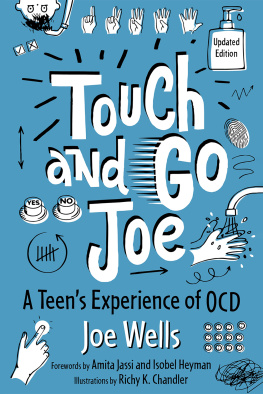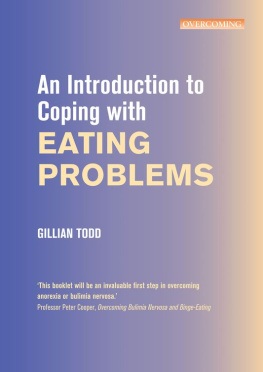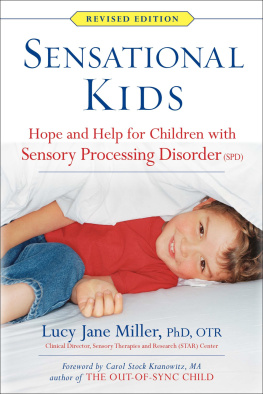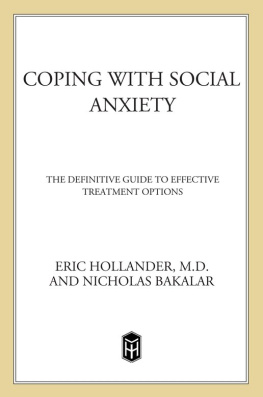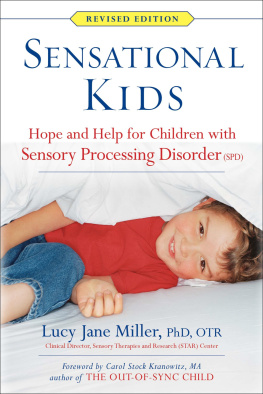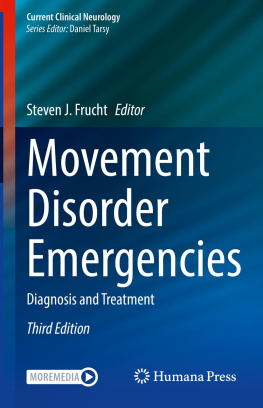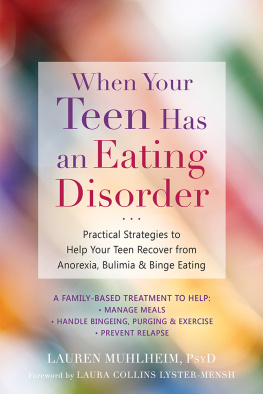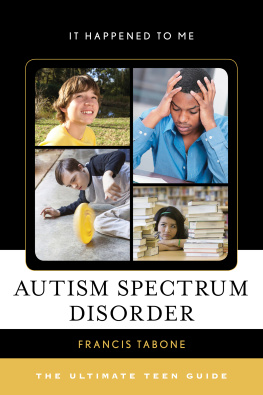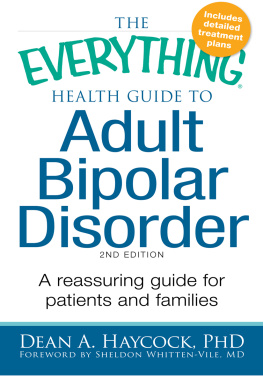Contents

Touch
and Go Joe
Updated Edition
A Teens Experience of OCD
Joe Wells
Forewords by Dr Amita Jassi and Dr Isobel Heyman
Illustrations by Richy K. Chandler

Contents
Foreword by Dr Isobel Heyman
I feel as if I have been waiting for this book. Children and teenagers with Obsessive Compulsive Disorder (OCD) have been asking for this book for years. You are not alone is a message young people with OCD most need to hear. Parents, doctors, therapists may say this, but a teenager with OCD will really believe it when they hear it from another teenager with OCD. Joe Wells has written his own very personal account of his struggle with, and recovery from, OCD but incorporates all of the important messages for any young person coping with this illness.
A teenager reading this book, who feels they are the only one dealing with unwelcome, distressing, repetitive thoughts (obsessions) and annoying, time-consuming, repetitive behaviours (compulsions), will learn that these are the characteristic symptoms of OCD. They will also learn, from Joes account, how OCD can creep up on you, symptoms gradually appearing over months or years. The child with OCD often feels confused, ashamed and secretive, so even close family members may take a while to be aware of the problem, as in Joes case. A book like this may be just what a young person with OCD needs, to feel able to confide in someone, and begin to get the help they need to recover.
Especially helpful is Joes account of how OCD symptoms need not include the familiar rituals of handwashing, or checking, but can include more hidden, but equally distressing, rituals such as counting, or repeating. Other aspects of OCD intrusive religious, sexual or aggressive thoughts are often highly distressing to a teenager, yet all are identified as being well-recognized symptoms of OCD. Any teenager reading this section will feel hugely relieved to know that these thoughts are common in OCD, and not some strange manifestation of their own condition.
Joe emphasizes that OCD is not just annoying, it can interfere with many of the pleasurable aspects of life. He explains how it affected his enjoyment of holidays or ability to see his friends, themes familiar to most teenagers with OCD. One of the aims of this book is to help increase awareness and recognition of OCD. Joe gives a moving account of the frustrations he and his family experienced trying to get the correct diagnosis. Perhaps if such a book had existed when Joe first needed to see a doctor, the symptoms of OCD would have been recognized earlier! This book will be a valuable resource for young people with OCD and their families, as well as teachers and other people who work closely with children. Health professionals, even those familiar with OCD, will be enlightened and moved by this personal account.
Joes account, whilst highlighting some of the fear, exasperation and distress he experienced, also emphasizes how recovery is possible. There are clear accounts of the effective treatments. Talking therapies are often perceived as mysterious and secret, but Joe opens up the therapy room and explains just how practical and sensible good Cognitive Behavioural Therapy should be. He also dispels many of the myths and worries associated with medication for OCD, describing how drugs used carefully, with monitoring, can really help the recovery process for some people.
Perhaps most importantly, Joe emphasizes that OCD should never be allowed to take over. Anybody with OCD is still themselves, and even whilst in the process of recovery, it is important to get on with life. So for Joe it is certainly no longer Touch and Goit is Go Joe Go!
and that is his message for everyone coping with OCD.
Dr Isobel Heyman
Consultant Psychiatrist
National & Specialist Service for Young People
with OCD, Maudsley Hospital, London
Foreword by Dr Amita Jassi
At the age of 16, Joe Wells took the brave decision to write this book as a young person experiencing OCD. In this updated edition we get a bonus chapter, 16 years on, in which Joe looks back at his teen years and gives us an insight into what life looks like now for him as an adult. All these years later, his experiences and the messages weaved into his story have stood the test of time and are still relevant and important for young people today. The key messages being you are not alone, and you can get better!
Joe takes us on a journey from when he first started to develop OCD symptoms at the age of nine, through the evolution of his OCD manifesting into different types of symptoms, to his eventual diagnosis and recovery. Unfortunately, despite being 16 years on, this story is a familiar one to me, where young people with this common condition often have delays in recognition, diagnosis and effective treatment, especially for the lesser-known obsessions and compulsions. The important message that Joe shares is that even if it feels scary, embarrassing, shameful or all of the above, it is important not to keep OCD a secret. Once you can tell others what is going on, you have a better chance of accessing the support you need.
Joe shares how his OCD manifested in different ways and evolved over time, which is common. It started with the better-known handwashing rituals, moving onto lesser-known rituals, including mental rituals (saying phrases in his head), tapping, walking in particular ways, blinking, and counting. Joe talks about the obsessions he had, such as contamination worries, fear of God and fear of other people dying. This is just the tip of the iceberg one thing that has kept me interested in working with OCD since 2006 is that you will always hear about a vast range of obsessions and compulsions; you sometimes even hear things you may not have heard about before! OCD can pick on any thought (that we all get from time to time) and make it intrusive, repetitive and distressing. This is true of compulsions too we all have habits that we have to do but OCD can take it to the extreme and make you feel you absolutely must do them. As Joe says, we all have intrusive thoughts and annoying habits, but with OCD they cause distress and interfere in peoples lives. It is important to remember that regardless of the type of OCD you have, it works in the same way and the treatment is the same.
Joe speaks openly about his experience of the two evidence-based treatments for OCD: Cognitive Behavioural Therapy (CBT) and medication, namely selective serotonin re-uptake inhibitors (SSRIs). Joe talks about how in his CBT he challenged thoughts and completed experiments to see if what OCD was saying would come true. Another important part is Exposure and Response Prevention (ERP) where you face OCD triggers, resist doing what OCD wants you to do (compulsions, avoidance or seeking reassurance) and tolerate the anxiety, which eventually comes down. You can learn something about whether OCD is telling the truth or not, but sometimes OCD can plant thoughts and ideas that are hard to prove such as going to hell or something bad happening in the future, so it is about tolerating the anxiety and uncertainty. The more you do ERP, starting with easier compulsions and moving onto harder ones, the easier it gets and eventually OCD starts to back off! Joe reveals how CBT wasnt easy, which many will relate to, but it did help.
Joe talks about the impact OCD had on his family, social life, confidence and mood. What he highlights is it is really difficult for families to know what is going on at first and what to do for the best, which is completely understandable. It is important parents know that it is not their fault or their childs fault that they have OCD. I describe it is an unlucky lottery (although you have more chance of getting OCD than winning the lottery!) We do not know the cause, but we know treatment works and that is the important thing to remember. Another important message to take away from this book is that OCD is not you it is not part of your personality, it is not your identity, it is something you suffer from. You are still you!

